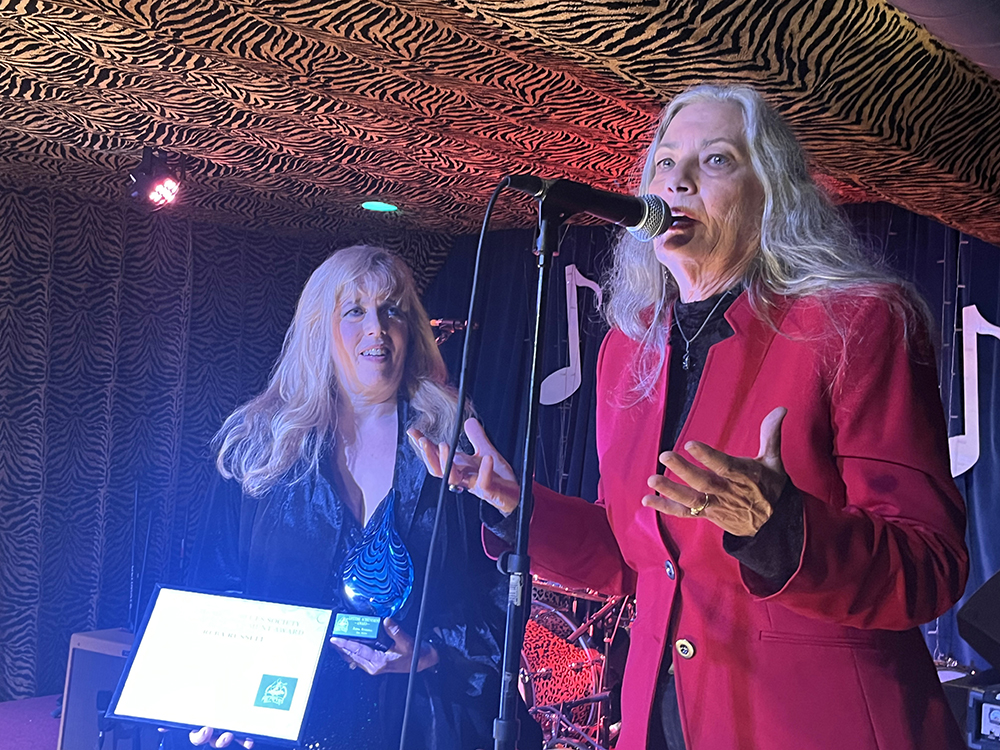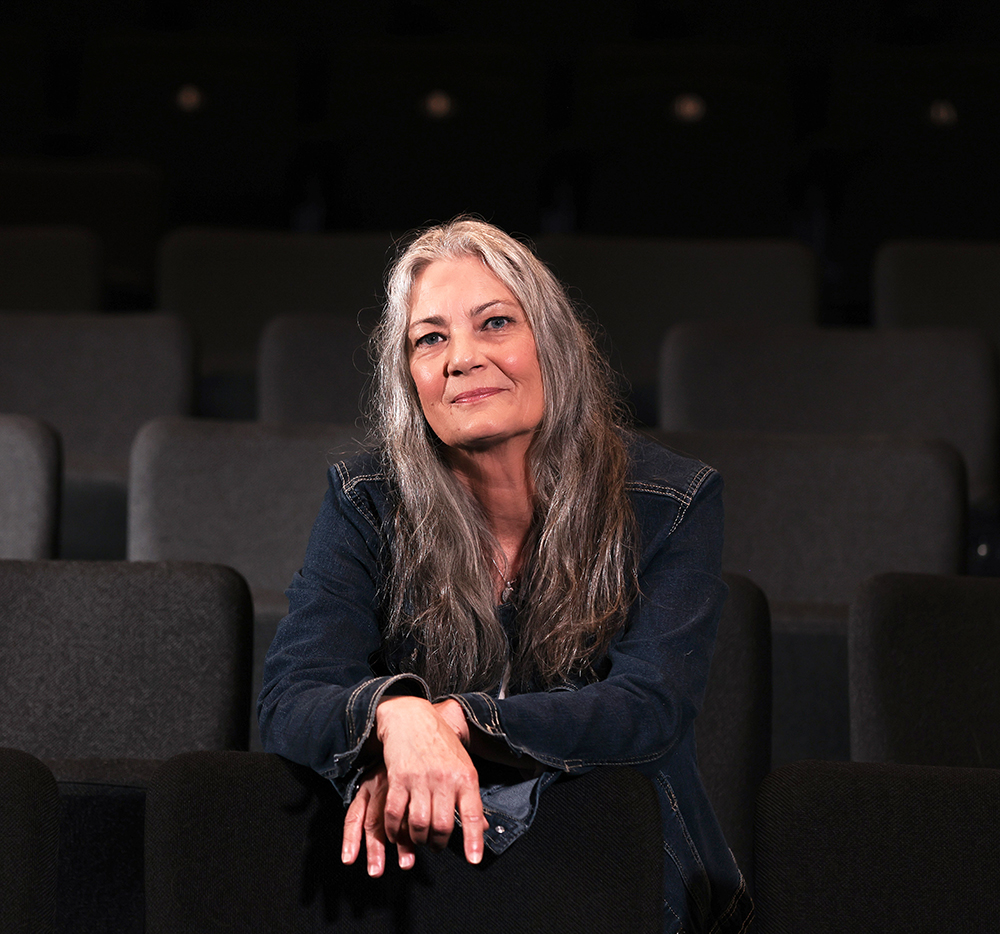Last Saturday at Hernando’s Hide-A-Way, the Memphis Blues Society recognized nine artists for their regional and global impact with its Lifetime Achievement Awards. Among the awardees were Thomas Bingham, Charles Gage, Mike Glenn, Eric Hughes, Al Kapone, Memphis Gold, Andrew “Shine” Turner, and Jay Sieleman, a roster marked by its eclecticism and inclusiveness. Yet there was one more recipient who was especially notable: Reba Russell. As one of the few local women still regularly singing the blues in this town (also including Barbara Blue and the incomparable Joyce Cobb), the celebration of Russell’s decades-long career was significant beyond the music itself.
It was an appropriate award for the artist who only last year released the powerful single, “Women Rule.” As Russell says, “You know, I am a woman-lover. I believe in women, and I want women to do good, and I have even been ugly and kind of mean to men over my career and in life! It’s one of my favorite themes. But I’m really passionate about that. I really believe it. I just don’t think we get a good enough shake and that we’re still trying to overcome that.”
Saturday’s ceremony, then, meant a great deal to Russell. “Memphis doesn’t support the blues or the Memphis Blues Society like it could, you know,” she says. “I just wish there were more people that cared, but at the same time, it was just a big, warm hug. And for me personally, Wayne and James and Sally were there, and they were at the very first gig I ever played at RP Tracks.”

That would be Wayne Russell, her husband and bass player; drummer James Cunningham; and longtime friend Sally Raburn, who, Russell says, “has been a music fan her whole life.”
Speaking of that first RP Tracks show back at the dawn of the ’80s, accompanied by her husband-to-be and Cunningham, Russell says today, “I told the dude who was giving me a ride there, my friend Bill Turner, ‘Take me home. I don’t want to do this. I’m scared!’” Luckily for the club-goers that night, Turner stayed the course.
But it was still nerve-racking for the young singer. “I pretty much sang with my back to the audience,” she laughs, and that was not lost on Raburn. “She was the one who, at the end of that night, came up and said, ‘You are an amazing singer, but you know, it’d be nice if we could see your face. You should turn around while you’re singing!’”
It may be hard for today’s fans to reconcile that stage fright with the bold, bawdy blues (and soul and rock) singer they know. That’s summed up by longtime Memphis multi-instrumentalist and erstwhile guitarist for the Reba Russell band, Paul Taylor, now living in Wisconsin. “You could ask anybody about Reba,” he says, “and they would say that she’s one of the most electrifying vocalists you’ll ever hear in person, and she never fails to deliver, and she has the same powerful voice that she’s had for her entire career. I just marvel at her every time because she just has such an intense power.”
That power was apparent to friends who heard her even before that first show, and Russell credits their encouragement as a key motivator back in those early days. Through a series of bands, first Visions, then Portrait, and finally Reba and the Portables, Russell, Wayne, and a rotating cast of band members took the city by storm, performing mainly covers at clubs like Solomon Alfred’s or the Bombay Bicycle Club. In the meantime, the singer and her bassist were clicking romantically, marrying in 1986.
Yet on her journey, from the Portables becoming one of the city’s premier cover bands, to a production deal with Chips Moman, to finally leaning into singing and recording her originals with the Reba Russell Band, the singer has remained appreciative of friends who helped her along the way. At Saturday’s event, Russell says, “I just got up there and praised Memphis and Memphis musicians and producers and engineers and everybody who perpetuates the whole blues scene. Because, you know, I had no experience when I started. I came here and, boom, everybody helped me. Nobody was ugly to me or told me to go away. So I was just trying to express my appreciation to the fabulous musicians in this town, many of whom aren’t here anymore, that have left the planet, yet were so instrumental in helping me and other people get on our feet and become worthy and hard-working musicians.”
That gratitude extended to her fellow awardees as well. “It was really awesome to be included in that group because there were some really cool other people that were given awards that night,” says Russell, noting that it reflected well on the the Memphis Blues Society. Founded in 2005, it gave aid to blues artists during Covid, then launched its Lifetime Achievement Awards in 2021
“There are blues purists, and then there are people who are into opening the blues up,” she observes. “It was really cool that Al Kapone was honored last night, and he spoke about that. He has been advocating and adding a blues feel and blues themes to his rap, and I’m sure that there are a lot of blues purists who kind of thumb their nose at that. But from my point of view, it’s absolutely amazing that he’s doing that, and teaching kids, and passing that blues legacy on. I really enjoyed his speech. What he said was really important.”
Reflecting a bit more on the evening and Al Kapone, she continues, “I think he was as proud as I was about receiving the award. And, you know, he’s a lot younger than I am, and he’s got a long time to perpetuate his artistry. So yeah, that part was lovely to me because it was about the continuation of this genre. It’s important for younger people to get hip to it.”
